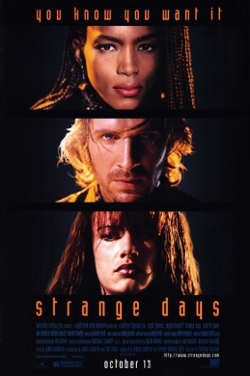Thursday, April 30, 2020
Strange Days (1995)
Directed by Kathryn Bigelow and written by James Cameron, Strange Days is a mashup of Christopher Walken’s Brainstorm (1983) and the LA riots. It’s not The Matrix (1999), it’s not Escape from New York (1981), it’s a mix of different things that starts strong but fizzles out in the end.

So much shit happens in the movie that I will not attempt to summarize the plot. It has some big names attached to it and some money behind it. Bigelow and Cameron, young lovers at the time, must have pursued the film as kind of big-budget passion project. What it has in resources it lacks in artistic restraint, presenting vistas of a world on the brink of war, with a Snake Plissken lookalike peddling memory disks to rich clients.
The technology presented has a now-present-day equivalent: a VR camera strapped to the head. Most people don’t have issues with motion sickness, so it would probably work fine, and the characters in the film don’t seem too bothered by head movement either. If such experimental films exist, I am not aware of them. In Strange Days they’re the new hotness. One character explains:
The technology was developed for the feds to replace the body wire, and now it’s gone black market.
To go from audio recorder to neural interface is quite a jump. I don’t buy it. I won’t shoot down the film because of bad science. It’s a watchable film, but because of the oversights it’s closer to fantasy than hard sci-fi.
I would like to point out that this very website is named after a short film I made called Microsm, which deals with neural interface. (And VR, and zombies, but whatever.) Strange Days approaches the same technology from a naive 1990s perspective. As has been demonstrated with Elon Musk’s Neuralink venture, to get a high-fidelity interface you have to do invasive surgery. There is no way that someone can wear a swim cap that directly records the brain to the resolution of images. Enough research was done by 1995 that Cameron should have known better.
Let’s compare the film to to The Matrix. Both are cheesy melodrama, but one thing The Matrix got right was presenting post-quantum new age philosophy in a literal and understandable framework. One of its subtler touches was calling the g-men “agents”, which is not only a term for software but also refers to agency, a more precise alternative to the concept of free will.
If Strange Days had the philosophical intelligence of The Matrix, Ralph Fiennes wouldn’t be whining about Juliette Lewis, as interesting as she is. (Brigitte Bako of Replikator fame had the more interesting role anyways, and was willing to do scenes that Juliette Lewis was not.) The romance gets in the way of the more poignant things the film is trying to say about technology and police corruption, and by the end it all gets lost in the noise. Maybe the big statement is about the nature of cops or humans in general, I’m not really sure.
This isn’t hard-boiled gritty hard sci-fi, of which there is tragically little in our world. I don’t know what I expected. It’s a watchable film, but not the breakout indie darling it’s made out to be, nor deserving of its supposed cult following and as much praise. It had a lot of money behind it, and the writing is pretty average. If you want hard cyberpunk, just watch Webmaster (1998).